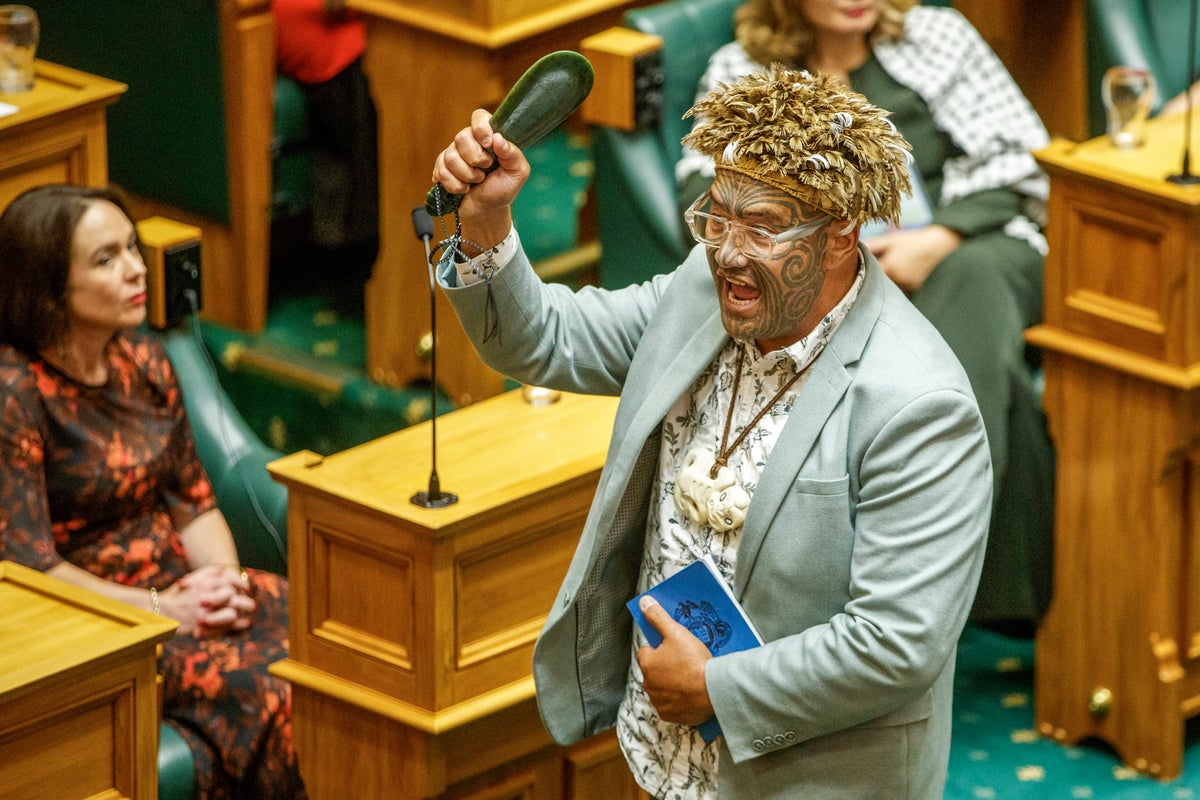
New Zealand’s indigenous leaders broke with protocol on Tuesday – and may have insulted King Charles III in the process – at the opening ceremony of the country’s new parliament.
The parliament was sitting for the first time since the 14 October election, during which MPs must swear an oath to Charles, who is New Zealand’s head of state.
But three MPs belonging to Te Pati Maori, the smallest party in the parliament, changed the wording of their pledge from Kingi Tiare to Kingi Harehare. According to the Maori Dictionary Project, Tiare means Charles, while the website refers to harehare as “skin rash, sore, eczema, skin ailment, skin disorder”.
Linguistic experts debated whether the variation was likely to be an honest use of an alternative way of saying Charles in Maori, with one of the MPs involved defending it as such, while another admitted they were being “provocative”.
But it comes at a tense time for race relations in New Zealand, with the MPs’ Te Pati Maori party leading protests across the country earlier in the day.
Six parliamentarians belonging to the indigenous party held their own swearing-in at parliament, pledging allegiance first to their descendants, to tikanga, or Maori practices, and the Maori version of the Treaty of Waitangi, before heading to the clerk of the house to make their legally required oath to Britain’s King.
The alternative ceremony took place alongside the official swearing-in in the house, when all 123 MPs swore allegiance.
The Treaty of Waitangi, signed in 1840, laid down a set of principles under which the British and Maori agreed to govern New Zealand, but the English and Maori versions differ and there is debate over whether the Maori ceded sovereignty.
Te Pati Maori, which would like to remove the King as head of state, said in a statement on Friday that the oath of allegiance was symbolic of parliament placing New Zealand’s colonial power above the standing of Indigenous people.
The three parliamentarians who used a different name for Charles were Rawiri Waititi, Debbie Ngarewa-Packer and Takuta Ferris. One of them, Mr Waititi, later defended the word he used, saying “hare” is a word that can mean Charles in some areas of New Zealand for Maori speakers, reported The Guardian.
“Harehare is another name for Charles. Yes, Hare is another name for Charles,” he said, as he claimed not knowing any other meaning for the word.
“Those are the words we use on the coast,” he was quoted as saying by New Zealand’s Newshub.
Jack Potaka, a Maori language expert with Te Tari Consultants, told The Guardian that “hare” can have different meanings in different regions including “skin rash” and “Charles or Charlie” as he cautioned that the intended meaning can only be confirmed by the speaker.
“This linguistic diversity underscores the potential for varied interpretations influenced by regional nuances,” Mr Potaka said.
But Ms Ngarewa-Packer said the MPs were deliberately being “provocative”, when asked by Radio New Zealand. “Always provocative because that’s what we have,” she said.
The leaders of the indigenous party also voiced their disdain with the current oath, asking for an option to choose allegiance to both the King and the Treaty of Waitangi.
“There should be an option available,” Ms Ngarewa-Packer said. “I think what we’ve introduced [by changing the oath] is how easy it could be done. No one was offended except for a couple on [the government side of the house].”







